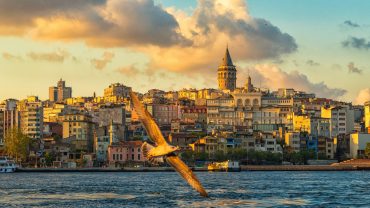
Rize is the capital city of Rize Province in the eastern part of the Black Sea Region of Turkey.
Name
The name comes from Greek as though ρίζα (riza) or Ριζαίον (Rizaion)], meaning “mountain slopes”,ρίζα in Greek means root. In modern times, its name in Greek was usually Ριζούντα (Rizunda). Its Latin forms are Rhizus and Rhizaeum, the latter of which is used in the Catholic Church’s list of titular sees as the name of bishopric of the town, which was once part of the late Roman province of Pontus Polemoniacus). The name Rize is spelled ريزه in Ottoman Turkish, and რიზე in Georgian. The name in Laz is Rizini (რიზინი).
History
The first written mention of Rize is made by Arrian in a work named Periplus of the Euxine Sea,[6] as a city founded at the mouth of the homonymous river (the ancient and Byzantine ῾Ρίζιος ποταμός[7]). Dated at 130–131 AD and written as a letter to Roman Emperor Hadrian, the work records how its author, the governor of Cappadocia, made an inspection tour of the Eastern Black Sea territories that were part of his jurisdiction, first visiting the Roman Empire’s Eastern Anatolian frontier garrisons before pushing on to the Black Sea coast in the Trabzon (Trebizond) region.
The city of Rize formed part of historic Georgian province of Chaneti (Georgian: ჭანეთი). From 1547 Chaneti province was incorporated by the Ottoman Empire and became a part of the sancak of Lazistan. The city was claimed by the short-lived Democratic Republic of Georgia between 1918 and 1920. On the basis of the 1921 Treaty of Kars, Soviet Russia granted Rize to Turkey just as the other territories of Artvin, Ardahan, and Hopa (Georgian: ხუფათი).
Geography
The city is built around a small bay on the Black Sea coast, on a narrow strip of flat land between the sea and the mountains behind. The coastal strip is being expanded with landfill and the city is growing up the steep hillsides away from the coast. Rize enjoys a mild, extremely wet climate, vulnerable to storms coming off the Black Sea and therefore the surrounding countryside is rich with vegetation and is attracting more and more visitors every year.
Rize is a center for processing and shipping Rize Tea, the tea grown in the surrounding area. Tea was introduced in the region in the 1940s and 1950s, changing the destiny of the region, which was desperately poor until then.[9] The city has a tea research institute founded in 1958 and tea gardens are the main sight in the town’s panoramic view. Tea and kiwifruit plants are even planted in gardens around the town. The secondary activity is fishing. Rize is linked by road with Trabzon (41 miles [66 km] west), Hopa (55 miles [88 km] east on the Georgian border, and Erzurum (north). The nearest airport is in Trabzon.
Rize is a quiet town, a typical Turkish provincial capital with little in the way of night life or entertainment. However the border with Georgia has been open since the early 1990s, the Black Sea coast road has been widened and Rize is now wealthier than in previous decades; there are more cars in the streets, higher buildings on the sea front, and some places for young people to go are opening up now. The visitors to the surrounding countryside also contribute to the economy of the town.
Climate
Rize has a humid subtropical climate (Köppen climate classification: Cfa). Snowfall can be heavy once it snows. The climate turns continental (Dfb) on the hillsides and subarctic (Dfc) on mountain slopes and yaylas, a term used in Turkish for highlands and highland plateaus.
Rize and the eastern part of the Black Sea coast where it is situated has the highest precipitation in western Asia, with an annual precipitation averaging around 2,500 millimetres (100 in), with heavy rainfall year-round and a maximum in late autumn (October to December). The Black Sea coast receives the greatest amount of precipitation in Turkey and is the only region of Turkey that receives high precipitation throughout the year. The water temperature, as in the whole Turkish Black Sea coast, is always cool, fluctuating between 8 and 20 °C (46 and 68 °F) throughout the year.





Comment (0)